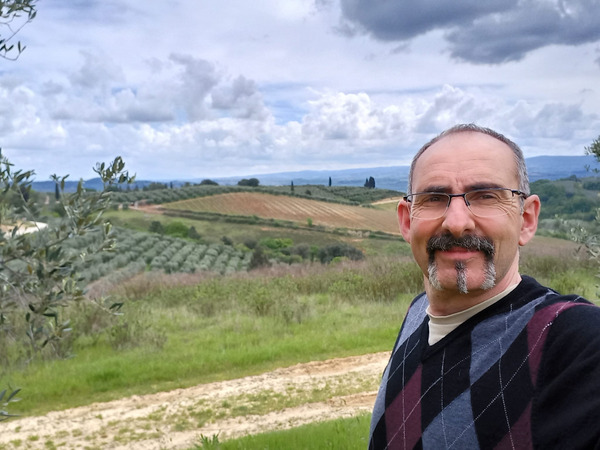Can you briefly introduce yourself and your activity? How long have you been working as an agricultural advisor, and which crops or types of livestock do you focus on?
I am Angelo Bo, a freelance advisor with twenty-four years of experience. I primarily work within the olive production chain in its entirety, as well as in plant protection across the board. I work mainly in integrated and organic agriculture, using tools and strategies to protect various crops, from olives to vegetables, vines to fruit trees, mainly in the Italian regions of Tuscany, Liguria, and Veneto. For the past ten years, I have also been involved in training farmers on topics such as plant protection, mandatory training for the sustainable use of plant protection products, key crops for obtaining professional farmer certification, olive cultivation techniques, and organic farming.
What inspired you to adopt digital technologies in your farming practices? Was there a specific moment or challenge that led you to this decision?
A great opportunity for me was being part of the AgroAmbiente.info working group in Tuscany since 2001. This initiative, part of the regional plant protection service of Tuscany (prior to the establishment of the regional agency for agricultural and forestry development and innovation), allowed me to collaborate closely with plant protection experts and IT professionals. Our main task was to find solutions to improve the dissemination of useful information for farmers.
In the execution of this activity, the main areas of focus were at least three: data collection, data processing with the creation of indices and predictive models, and the return of results in the form of defense strategies for both technicians and farmers. In all three areas, digitalization played an important and continuously evolving role, as the available technologies have made significant advances since 2001.
How has your farming background (i.e. previous sustainable farming practices) influenced your approach to adopting new technologies?
Certainly, understanding the problem to be addressed in its various aspects highlights the negative effects of certain actions. Therefore, being able to use new technologies to achieve greater precision in what we do has been crucial in pursuing the goal of optimizing field implementation of defense strategies and consequently reducing plant protection treatments.
What specific digital technologies or tools are you currently using in your work (e.g., precision farming tools, IoT devices, drones, sensors, etc.)?
I'm using smartphone apps (e.g., Poderi), the AgroAmbiente.info portal, and specific apps related to weather stations and sensor systems of the individual farms I work with. It would be very interesting to work, for example, with vigor maps and photosynthetic activity data to better calibrate defense measures, nutrition, or biostimulant applications. Unfortunately, olive farming has been in decline for decades, and unless the use of digital tools is promoted through research projects, these technologies are not easy to introduce either into growers' budgets or their mindset.
Could you share an example of how these digital tools are used in your daily operations? What are the most significant benefits you've experienced from using digital technologies in your agricultural advisory work (e.g., increased efficiency, reduced environmental impact, better decision-making)?
The key aspect undoubtedly revolves around improving the collection and management of data or any other objective information, as well as enabling quick exchanges between the parties involved in decision-making, which is essential for developing effective strategies.
Data collection also makes it possible to better assess actual differences between fields or time periods and to establish historical average values, providing additional support in evaluations and decisions, moving away from the usual, unhelpful, and highly unscientific "it seemed to me that..."
Have you encountered any challenges in implementing or using digital technologies in your work? If so, what were they and how did you overcome them (if applicable)?
By now, internet connectivity is excellent throughout the regions where I operate, an aspect that in the past had created many difficulties in the spread of digital tools. With that obstacle now overcome, the main challenge remains the difficulty many people have in using them, not always due to the actual complexity of the tools, but often because of a distrust toward smartphones in particular, which in rural areas are seen as too intrusive. So, it's both a reluctance or unwillingness to use the digital tools, as well as a struggle to approach the objectification of operations and processes in numerical form. This disaffection increases significantly in cases of minor malfunctions or when certain steps are objectively more complex. In this regard, and to highlight the general lack of familiarity, let's remember that many small to medium-sized businesses are still unable to implement management control systems, and therefore data collection on costs, especially when it involves aspects that appear less tangible.

 tap and then scroll down to the Add to Home Screen command.
tap and then scroll down to the Add to Home Screen command.